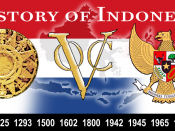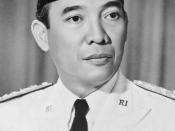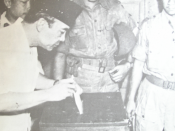A President Sukarno - biograhy
Sukarno (June 6, 1901 - June 21, 1970) was the first President of Indonesia. He helped the country win its independence from the Netherlands and was President from 1945 to 1967. Sukarno was forced from power by one of his generals, Suharto, who formally became President in March 1967.
Sukarno became a leader of a pro-independence party, Partai Nasional Indonesia when it was founded in 1927. He opposed imperialism and capitalism because he thought both systems worsened the life of Indonesian people.
He also hoped that Japan would commence a war against the Western powers and that Java could then gain its independence with Japan's aid. He was arrested in 1929 by Dutch colonial authorities and sentenced to two years in prison. By the time he was released, he had become a popular hero. He was arrested several times during the 1930s and was in jail when Japan occupied the archipelago in 1942.
Sukarno's vision for the 1945 Indonesian constitution comprised the Pancasila(Indonesia 5 point state ideology). Sukarno's political philosophy was guided by elements of Marxism, nationalism and Islam. This is reflected in the Pancasila, in the order in which he originally espoused them in a speech on June 1, 19451:
Nationalism (with a focus on national unity)
Internationalism ('one nation sovereign amongst equals')
Representative democracy (all significant groups represented)
Social Justice (Marxist influenced)
Theism (with a secular bent)
Sukarno resented his figurehead position and used the increasing disorder to intervene more in the country's political life. Claiming Western-style democracy wasn't suitable for Indonesia, he called for a system of "guided democracy" based on what he called traditional Indonesian principles. The Indonesian way of deciding important questions, he argued, was by way of prolonged deliberation designed to achieve a consensus. He proposed a government based...



Nice
nice essay...good information...
0 out of 0 people found this comment useful.